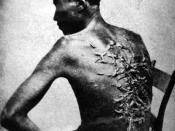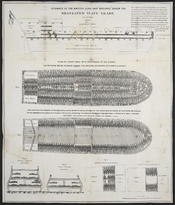Written just before the civil war era and the great debates over slavery, the novella "Benito Cereno" casts the slaves as the main antagonists. The harsh words Melville uses to describe the slaves could be used on any mutineers. But the fact that Melville casts the slave in the roles of mutineers shows that he is making a statement on slavery. The way Herman Melville portrays the malevolence of the slaves depicts the institution of slavery as the primary evil rather than the actions of the slaves themselves.
One may think that the slaves acted evil because they rebelled even though their master Alexandro allowed them to "â¦[sleep] upon deckâ¦and [not wear] fetters." (209) instead of confined, unlike the many other slave ships of that time. Melville describes them as "delirious black dervishes" (203) portraying them as bloodthirsty savages, particularly Babo "â¦who [was] the ringleader" (209). But Babo proved to be fiercely loyal; "â¦he uttered no sound, and could not be forced to."
when he was captured by Delano, showing that the slaves were not completely without morals. Instead what is evil is the institution of slavery. It is wrong for one person to own another and look down upon them. Evil seems to breed evil, and therefore, the slaves revolted with violence as they "⦠[killed] eighteen men of those who were sleeping on deck" (209). But their goal was to "be sure of their liberty." The fact that they revolted "â¦early morning on the seventh dayâ¦" shows their need for freedom was not suppressed by good conditions. And "all the negroes, though not in the first place knowing to the design of revolt, when it was accomplished, approved it." The slaves were glad to revolt in order to gain their freedom. Using these conditions Melville shows...


